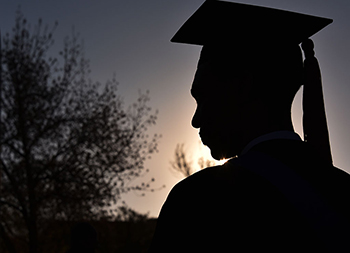
Eleven graduation ceremonies will form part of the
mid-year graduation ceremonies at the
University of the Free State.
Photo: Charl Devenish
Livestream of Graduation Ceremonies
Six days, eleven ceremonies, and more than 5 000 degrees. This all forms part of what is the biggest set of graduation ceremonies in the history of the University of the Free State (UFS).
The mid-year graduation ceremonies, taking place from 19 to 26 June 2017 in the Callie Human Centre on the Bloemfontein Campus, will see the most students graduate during a week. A total of 5 258 degrees, which includes 460 master’s and doctoral degrees, will be conferred – including 72 doctoral degrees.
First graduation ceremonies for Prof Petersen
It will also be the first ceremonies that Prof Francis Petersen, new Rector and Vice-Chancellor, attends on the Bloemfontein Campus. Students from all seven faculties, as well as the South Campus, will graduate.
Graduates per faculty are (without master’s and doctoral degrees): Faculty of Education (488), Faculty of Health Sciences (345), Faculty of Theology (29), Faculty of Law (686), Faculty of Natural and Agricultural Sciences (1 029), Faculty of Economic and Management Sciences (1 044), Faculty of the Humanities (826), and the South Campus (354).
Guest speakers include three judges
Guest speakers for the ceremonies include Dipiloane Phutsisi, Principal and Chief Executive Officer of the Motheo TVET College in the Free State, Dr Susan Vosloo, UFS Council member and founder member of the World Society for Paediatric and Congenital Heart Surgery, and Prof Petersen.
Three judges will also act as speakers. They are Justice Ian van der Merwe, Judge of Appeal at the Supreme Court of Appeal and former Chair of the UFS Council, Justice Mahube Molemela, Judge President of the Free State Division of the High Court and Acting Justice of the Supreme Court of South Africa, and Justice Connie Mocumie, Judge of Appeal at the Supreme Court of Appeal.
Graduations ceremonies:
19 June 2017:
09:00: Faculty of Education, except educational qualifications in Open Distance Learning – South Campus
14:30: Faculty of Health Sciences, Faculty of Theology and Faculty of Law (including the School of Financial Planning Law)
20 June 2017:
09:00: Faculty of Natural and Agricultural Sciences: All Bachelor’s degrees
14:30: Faculty of Natural and Agricultural Sciences: All Diplomas and Bachelor Honours degrees
21 June 2017:
09:00: Faculty of Economic and Management Sciences: All Certificates, Diplomas, Bachelor’s degrees and Bachelor Honours degrees, excluding BCom degrees
14:30: Faculty of the Humanities: Social Sciences and Communication Sciences only
22 June 2017:
09:00: Faculty of Economic and Management Sciences: BCom degrees only
14:30: Faculty of the Humanities: All qualifications except Social Sciences and Communication Sciences
23 June 2017:
14:30: Educational qualifications in Open Distance Learning – South Campus
26 June 2017:
09:00: All faculties except the Faculty of Natural and Agricultural Sciences: Master’s and Doctoral degrees
14:30: Faculty of Natural and Agricultural Sciences: Master’s and Doctoral degrees